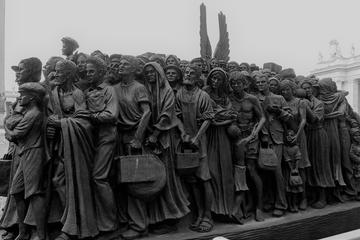
By Elena Dini
ROME — One month after the publication of Pope Francis’ new encyclical “Fratelli Tutti,” we have taken the time to reread passages and focus on key topics with Cardinal Michael L. Fitzgerald, M.Afr., apostolic nuncio emeritus to Egypt and, before that, president of the Pontifical Council for Interreligious Dialogue, from 2002 to 2006. We are most grateful to the Cardinal for taking the time to speak to us.
After analyzing the image of the world in which we live, Pope Francis dwells upon the Parable of the Good Samaritan in the second chapter of “Fratelli Tutti.” How do you read this Gospel passage within the encyclical?
The Parable of the Good Samaritan in the Gospel is 13 verses long. In this encyclical, there are more than 13 pages about it. It’s a long commentary on the parable and it is definitely relevant. What Pope Francis is trying to say is that brotherhood/sisterhood has no boundaries, it is question of a universal fraternity. We all belong to one human family so we cannot say that “these” people do not concern us. This is the point of the parable. Jesus does not say who is your neighbour, but to whom are you to be a neighbour, and no one is excluded.
Quoting St. John Paul II in “Centesimus Annus,” Pope Francis recalls that, “If there is no transcendent truth, in obedience to which man achieves his full identity, then there is no sure principle for guaranteeing just relations between people” (FT 273). Do you think that transcendence should have been highlighted more in this document?
Pope Francis is dealing here with social reality. Notwithstanding, this document is clearly inspired by the Gospel. The pope quite often refers to the “Document on Human Fraternity” where, together with the Grand Imam of Al-Azhar, he talks about the moral decline due to the fact that people forgot about God. The fact that we are all under God is always there, and it is explicitly mentioned.
There are actually various passages in which “Fratelli Tutti” quotes the “Document on Human Fraternity.” How would you describe for our readers the common points and important peculiarities of these documents?
In the introduction, Pope Francis clearly states that he felt encouraged by the Grand Imam of Al-Azhar to write this document and that “the present encyclical takes up and develops some of the great themes raised in the document that we both signed” (FT 5).
“Fratelli Tutti” is much wider in scope and touches on many different issues. As Pope Francis himself says, it is an anthology of his own teachings over the past seven years.
Being a common document with Muslims, the “Document on Human Fraternity” is dealing more with Christian-Muslim relations, although at the end it opens to all people of good will. “Fratelli Tutti” concerns everybody and it invites directly to a wider perspective.
A final thought about the relation between these two texts: at the beginning of the “Document on Human Fraternity,” we have a whole series of invocations that start with “in the name of God,” a very typical Islamic invocation, and then goes on with other categories of people — the poor, the innocent, etc. Interestingly enough, Pope Francis repeats this whole passage at the end of “Fratelli Tutti” and this was surprising.
In this document there is the idea that “nowadays we are either all saved together or no one is saved” (FT 137). How widespread is this awareness in our Catholic communities today in your experience?
Before COVID-19 we would say that “we” were alright. We knew about people suffering somewhere because of inequalities, persecutions and so on, but the temptation of thinking and saying that this did not concern us was there. A lesson the pandemic has taught us is that we are all concerned and vulnerable. We are all one and we are interdependent.
Many passages of the encyclical deal with politics and what the pope calls “political charity” (FT 190). How much do we need to focus on politics in our life as believers and how much do you think we should expect the Church to deal with it and in what ways?
We are told as clergy to leave politics to the lay people. On the other hand, the Church does not engage in party politics but has to be critical of society. Church and other religions have to have the space in order to criticize governments when needed.
Sometimes governments control religions and this is not good. When religious leaders are too close to the political leaders this is not good either. This “political role” has to be on behalf of human beings and of the wellbeing of all. If there is inequality we have to speak out; if there is injustice it is political charity, not political interests of the few, that has to be preserved. Politics should be at the service of all.
There is a role for the Church here: The Catholic Church has developed its social doctrine over the centuries and it is still developing it.
Religious freedom (FT 279) is another recurring topic in interreligious discourse and here, too, this issue is tackled. How do you feel about this issue having been at the core of the agenda for many years and still not realized?
The principle of religious liberty applies to all and it is not something related only to Christians. We are not pleading only for our own rights, we are pleading for the rights of all human beings, so that they have the right to respond to God in the way they feel they want to do it.
Religion is an organized body of believers and it includes public worship. This does not mean you need a big basilica in every country, but a place where you are safe and protected and free to practice as you wish as long as you obey the civil law. Human beings have been created to worship God — as Christians we believe that — and we should be able to express it.
Dialogue and identity are two terms often connected, but most of the time opposed for fear that engaging in dialogue might mean not being clear enough about one’s own identity. Pope Francis clearly states here that “a healthy openness never threatens one’s own identity” (FT 148). What has been your experience with regards to the discussions about these two terms over the past decades?
The Church has been more open to dialogue since the Second Vatican Council. John XXIII opened it to everyone, and Pope Paul VI in his first encyclical about the Church, “Ecclesiam Suam,” says that the Church has to be in dialogue with everyone: with the whole of humanity, with those who believe in God, with those who believe in Jesus Christ the Saviour and within the Catholic Church. This is part of the identity of the Church! The Church is not made for itself alone, it is made for the whole of humanity and creation, so it has to be open.
This is true as well for any single person. A person cannot be concentrated only on himself/herself. The other day I was told about a young child who just had a baby sister. This is a big change because right now he is no longer the sole focus of his family. He has to accept he has a sister and his identity changed because of this. Our identity develops in relationship with other people. If you marry, your identity becomes double in a sense and this couple cannot be just on its own: husband and wife relate to the extended family, to their children and to other people, too.
This can be applied to religions, too. We are sent into the world to give the message of the Good News and we cannot ignore each other; we walk together. Identity is a given but it is a developing given that develops through dialogue.
Before the two final prayers of the document, Pope Francis mentions Blessed Charles de Foucauld…
This was a surprise. Charles de Foucauld has been mentioned in “Dialogue and Mission,” the first official document of the then Secretariat for non-Christians. There were various witnesses of dialogue mentioned in that document and de Foucauld was one of them because of his way of just being present and open to other people. Here we find him again. No one could criticize Charles de Foucauld for not being Catholic. It is exactly because he was rooted in Jesus Christ that he was open to this universal brotherhood and this should be an encouragement for everyone.
Image by Stefano Dal Pozzolo taken at The Lay Centre's 2020 Inaugural Event “Planting Seeds of Hope: Grassroots Initiatives on Creating a Culture of Dialogue.”
Cardinal Michael Louis Fitzgerald, M.Afr., based in Liverpool, England, is a leading expert on Islam, Christian-Muslim relations and interreligious dialogue among the hierarchy of the Catholic Church. Cardinal Fitzgerald served as the apostolic nuncio to Egypt and delegate to the Arab League, from 2006 to 2012, after serving as the president of the Pontifical Council for Interreligious Dialogue for four years. He had served the same council as secretary since 1987. Born in England, he entered the novitiate of the Missionaries of Africa in 1956, and was ordained a priest in 1961. He spent most of the years that followed between Rome and the African continent, studying, teaching and doing pastoral work. During his years in Rome, he also served as rector of the Pontifical Institute of Arab and Islamic Studies and on the General Council of his order. He was created a cardinal in October 2019.

